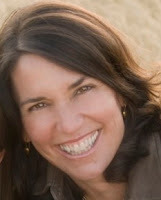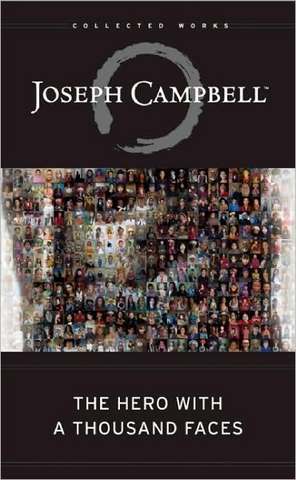Book Talk: The Hero With a Thousand Faces By Joseph Campbell
By Anne Gudger

Yes! She is back! Anne, my fantastic and wonderful co-teacher, has gifted us with a great write up on a new book. Book Talk is our gift to you, about what's out there and what's great about reading it.
The Hero With a Thousand Faces balances on the top of my stack of books—the pile that mirrors a game of Jenga meaning it's ready to topple over with one false pull. The Hero moves between the top, second and third spot on my pile. I've been reading it for almost a year and sometimes it feels like a thousand hours—in miniature bites—and I'm still not done. Weird for someone like me who's been aptly accused of eating books. It's SLOW. Or is it me who is slow?
For years I've heard writers say it's the storyteller's guide, the map they unfold and study again and again. This is where story telling starts—with myths and heroes. George Lucas credits Campbell for the shape of Star Wars. Wally Lamb (one of my favorite authors) said when he was stuck, he went back to read Campbell, back to the well for ideas. If you've read The Hour I First Believed, you know mythology and the hero's journey are huge.
LOVE Lamb's book, but that's for another Book Talk.
For me, that message of "Read this book" is also layered with my parents' fascination with Joseph Campbell. They read him, talked about him, loved him. When I was a teenager and trying to write meaningful poetry about my angst (awful stuff no one read—thank goodness.) I first tried to read Campbell but put him down just as fast. The man was too much for a sullen me at 14.
 But now, as I struggle to write my own memoir (and suffering with so much self-doubt, which I believe Jennifer talked about during the last teleseminar...and PS do not miss the one on June 9th for more insight...), I see myself on my own hero's journey and thus Campbell beckons me back. In The Hero, Campbell chronicles the history of myth, centered around the hero's journey--across antiquity, across cultures. He lays out the hero's path and flushes it out, drawing from his vast smarts. He defines the call to adventure, the initiation and the return. Each stage has multiple steps and requires specific actions of the hero.
But now, as I struggle to write my own memoir (and suffering with so much self-doubt, which I believe Jennifer talked about during the last teleseminar...and PS do not miss the one on June 9th for more insight...), I see myself on my own hero's journey and thus Campbell beckons me back. In The Hero, Campbell chronicles the history of myth, centered around the hero's journey--across antiquity, across cultures. He lays out the hero's path and flushes it out, drawing from his vast smarts. He defines the call to adventure, the initiation and the return. Each stage has multiple steps and requires specific actions of the hero.
The book is still super slow going but at 52, it's fascinating to read. Admitting this is, well, hard since I was a good student and a decent teacher. I like academics. I should feel right at home with Campbell. But then I think, hey, the guy understood James Joyce's Finnegan's Wake which puts him in a different universe from me. Of course I struggle with some of his writing.
Campbell's writing is dense, academic, masculine. He writes to a group who get it, who get the code. I'm not in that group. And it's okay. I hang out on the sidelines enough to get the bullet points.
I'm on my hero's journey. So are you. I'm writing about it like crazy. I like to imagine that one of the things I carry in my backpack is Campbell's book, so that when I get stuck I can find a good tree root to curl up next to and read the stage I'm in or the one coming up. He defines the stages of the journey beautifully and that is the gold for me.
If you read this story teller's guide here's what I suggest: Don't read it when you're comfy in bed with your favorite pillows and comforter or you just might wake up cradling the book and wondering what to make of your dream about centaurs.
And now tell me...does this book make you feel a bit intimidated? And what other books have you attempted to read and given up on because they were just too darn smart?

Yes! She is back! Anne, my fantastic and wonderful co-teacher, has gifted us with a great write up on a new book. Book Talk is our gift to you, about what's out there and what's great about reading it.
The Hero With a Thousand Faces balances on the top of my stack of books—the pile that mirrors a game of Jenga meaning it's ready to topple over with one false pull. The Hero moves between the top, second and third spot on my pile. I've been reading it for almost a year and sometimes it feels like a thousand hours—in miniature bites—and I'm still not done. Weird for someone like me who's been aptly accused of eating books. It's SLOW. Or is it me who is slow?
For years I've heard writers say it's the storyteller's guide, the map they unfold and study again and again. This is where story telling starts—with myths and heroes. George Lucas credits Campbell for the shape of Star Wars. Wally Lamb (one of my favorite authors) said when he was stuck, he went back to read Campbell, back to the well for ideas. If you've read The Hour I First Believed, you know mythology and the hero's journey are huge.
LOVE Lamb's book, but that's for another Book Talk.
For me, that message of "Read this book" is also layered with my parents' fascination with Joseph Campbell. They read him, talked about him, loved him. When I was a teenager and trying to write meaningful poetry about my angst (awful stuff no one read—thank goodness.) I first tried to read Campbell but put him down just as fast. The man was too much for a sullen me at 14.
 But now, as I struggle to write my own memoir (and suffering with so much self-doubt, which I believe Jennifer talked about during the last teleseminar...and PS do not miss the one on June 9th for more insight...), I see myself on my own hero's journey and thus Campbell beckons me back. In The Hero, Campbell chronicles the history of myth, centered around the hero's journey--across antiquity, across cultures. He lays out the hero's path and flushes it out, drawing from his vast smarts. He defines the call to adventure, the initiation and the return. Each stage has multiple steps and requires specific actions of the hero.
But now, as I struggle to write my own memoir (and suffering with so much self-doubt, which I believe Jennifer talked about during the last teleseminar...and PS do not miss the one on June 9th for more insight...), I see myself on my own hero's journey and thus Campbell beckons me back. In The Hero, Campbell chronicles the history of myth, centered around the hero's journey--across antiquity, across cultures. He lays out the hero's path and flushes it out, drawing from his vast smarts. He defines the call to adventure, the initiation and the return. Each stage has multiple steps and requires specific actions of the hero.The book is still super slow going but at 52, it's fascinating to read. Admitting this is, well, hard since I was a good student and a decent teacher. I like academics. I should feel right at home with Campbell. But then I think, hey, the guy understood James Joyce's Finnegan's Wake which puts him in a different universe from me. Of course I struggle with some of his writing.
Campbell's writing is dense, academic, masculine. He writes to a group who get it, who get the code. I'm not in that group. And it's okay. I hang out on the sidelines enough to get the bullet points.
I'm on my hero's journey. So are you. I'm writing about it like crazy. I like to imagine that one of the things I carry in my backpack is Campbell's book, so that when I get stuck I can find a good tree root to curl up next to and read the stage I'm in or the one coming up. He defines the stages of the journey beautifully and that is the gold for me.
If you read this story teller's guide here's what I suggest: Don't read it when you're comfy in bed with your favorite pillows and comforter or you just might wake up cradling the book and wondering what to make of your dream about centaurs.
And now tell me...does this book make you feel a bit intimidated? And what other books have you attempted to read and given up on because they were just too darn smart?
Published on June 03, 2011 14:11
No comments have been added yet.



